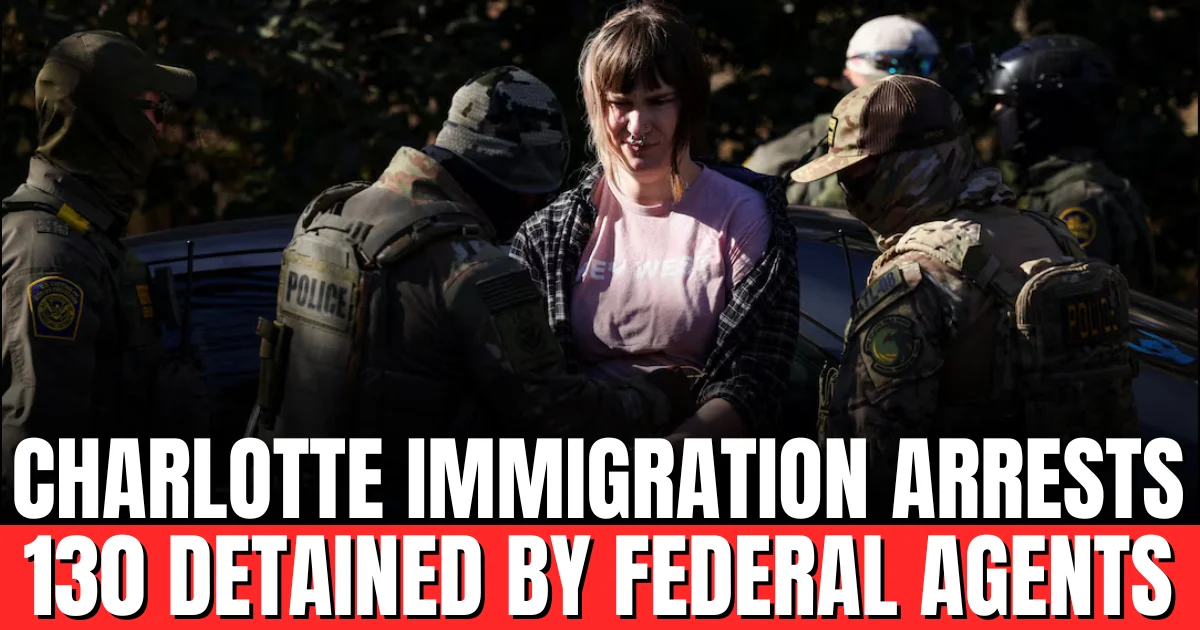Federal immigration enforcement operation in Charlotte results in 130 arrests. Details on the crackdown, legal implications, and community response.
Table of Contents
Federal Agents Arrest 130 People in Charlotte Immigration Enforcement Operation
Federal immigration authorities conducted a significant enforcement operation in Charlotte, North Carolina, resulting in 130 arrests over multiple days. The coordinated action represents one of the largest immigration enforcement efforts in the region in recent years.
Immigration and Customs Enforcement officials confirmed the operation targeted individuals with outstanding deportation orders and criminal backgrounds. Community advocates expressed concerns about the operation’s scope and impact on local families.
Details of the Enforcement Operation
Federal agents executed the multi-day operation across Charlotte and surrounding Mecklenburg County areas. The enforcement action involved coordination between various federal agencies and local law enforcement partnerships.
ICE officials stated the operation focused on public safety priorities and individuals with final removal orders. Arrests occurred at residences, workplaces, and during traffic stops throughout the metropolitan area.
Key operation details:
- 130 individuals taken into federal custody
- Operation spanned approximately one week
- Multiple Charlotte neighborhoods affected
- Mix of targeted arrests and collateral detentions
- Individuals transferred to detention facilities for processing
- Legal proceedings to follow for all detained persons
Federal authorities emphasized that enforcement priorities focused on individuals with criminal convictions or pending criminal charges. However, immigration advocates report that some arrestees had no criminal history beyond immigration violations.
Who Was Targeted in the Arrests
Immigration officials provided limited specific information about arrested individuals, citing privacy and ongoing legal proceedings. General demographic and legal status information emerged through official statements and community reports.
Characteristics of those detained:
Priority Enforcement Categories
Federal guidelines identify certain groups for enforcement priority including individuals with felony convictions, gang affiliations, or threats to public safety. ICE officials claim majority of Charlotte arrestees fit priority categories.
Final Removal Orders
Many detained individuals had exhausted legal appeals and received final deportation orders from immigration judges. Federal law requires executing these court-ordered removals regardless of how long ago they were issued.
Collateral Arrests
Some individuals present during targeted enforcement actions were also detained despite not being original operation targets. These “collateral arrests” occur when agents encounter undocumented individuals while executing planned operations.
Family Members
Reports indicate some arrestees were parents of U.S. citizen children or had deep community ties. These cases raise questions about family separation and enforcement discretion policies.
Employment-Based Detentions
Several arrests occurred at workplaces, disrupting businesses and affecting employees beyond those detained. Workplace enforcement remains controversial due to economic and community impacts.
Legal Process Following Arrests
Individuals detained during immigration enforcement operations enter federal custody and begin legal proceedings. The process involves multiple steps determining each person’s immigration status and potential outcomes.
Post-arrest procedures:
Initial Processing
Detained individuals undergo biometric collection, background checks, and case file reviews. Immigration officials verify identities and examine criminal histories and immigration violations.
Detention or Bond
Some individuals may request bond hearings to potentially secure release while cases proceed. Immigration judges evaluate flight risk and public safety factors when considering bond requests. Others face mandatory detention without bond eligibility.
Legal Representation
Unlike criminal cases, immigration proceedings do not guarantee government-provided attorneys. Detained individuals must find and fund their own legal representation or proceed without lawyers.
Immigration Court Hearings
Cases proceed through immigration court system where judges determine whether individuals should be deported or granted relief. This process can take months or years depending on case complexity and court backlogs.
Removal or Relief
Possible outcomes include deportation to home countries, voluntary departure agreements, or legal relief allowing individuals to remain in the United States. Each case’s specific circumstances determine available options.
Community Response and Impact
The enforcement operation generated significant reactions from Charlotte community members, advocacy organizations, and local officials. Perspectives varied widely based on political viewpoints and personal experiences.
Immigrant community reactions:
Widespread fear spread through Charlotte’s immigrant communities following the arrests. Many families kept children home from school and avoided public spaces. Community organizations reported increased calls from frightened residents seeking information about legal rights.
Local churches and advocacy groups established know-your-rights workshops and legal clinics. These efforts aimed to educate immigrants about constitutional protections and appropriate responses during enforcement encounters.
Law enforcement perspectives:
Federal officials defended the operation as lawful enforcement of immigration laws and court orders. ICE spokespeople emphasized focus on public safety threats and individuals with criminal records.
Supporters of immigration enforcement argued that operations uphold rule of law and protect American workers. They contend that failed asylum seekers and those with removal orders must face consequences.
Business community concerns:
Charlotte employers expressed concerns about workforce disruptions from immigration enforcement. Several businesses reported employee absences following the arrests as workers feared traveling to jobs.
Industry groups noted that many sectors depend on immigrant labor and that enforcement actions create economic uncertainties. These concerns reflect broader debates about immigration’s economic role.
Political Reactions and Policy Context
The Charlotte enforcement operation occurs within broader national immigration policy debates. Political leaders offered sharply contrasting responses reflecting partisan divisions on immigration issues.
Federal administration position:
Current administration officials characterize increased enforcement as fulfilling campaign promises and prioritizing American security. Policy directives expanded enforcement priorities beyond previous narrow categories.
Federal leaders argue that strong enforcement deters illegal immigration and encourages legal pathways. They maintain that compassionate immigration policy must include consequences for law violations.
State and local officials:
North Carolina state officials’ responses varied by political affiliation. Some praised federal enforcement efforts while others questioned operation impacts on communities and families.
Charlotte city council members expressed concerns about trust between immigrant communities and local services. They emphasized that fear of deportation might prevent crime reporting or accessing healthcare and education.
Congressional perspectives:
The operation reignited congressional debates about comprehensive immigration reform. Both parties acknowledge the current system’s failures while disagreeing about solutions.
Some lawmakers called for enforcement moratoriums and pathway-to-citizenship legislation. Others demanded increased border security and interior enforcement before considering legal status changes for undocumented immigrants.
Legal Rights During Immigration Enforcement
Immigration attorneys and advocacy organizations emphasized that all individuals, regardless of status, possess constitutional rights during enforcement encounters. Understanding these protections helps people make informed decisions.
Key legal protections:
Fourth Amendment Rights
People have rights against unreasonable searches and seizures. Immigration agents generally need warrants signed by judges to enter homes, though exceptions exist for exigent circumstances.
Fifth Amendment Rights
Everyone has the right to remain silent and not self-incriminate. Individuals can decline answering questions about immigration status or providing documents without attorney presence.
Right to Attorney
While immigration proceedings don’t provide government-funded lawyers, individuals can hire private attorneys. Having legal representation significantly improves case outcomes.
Consular Notification
Foreign nationals have rights to contact their country’s consulate for assistance. Consular officials can provide various support services to detained citizens.
Due Process
Immigration proceedings must follow established procedures providing opportunities to present cases before judges. Individuals can challenge deportation orders and seek relief forms.
Historical Context of Immigration Enforcement
Immigration enforcement operations have occurred under administrations of both political parties, though priorities and scales vary. Understanding this history provides perspective on current events.
Previous administrations implemented different enforcement approaches ranging from broad workplace raids to focused criminal alien operations. Each approach generated controversy and debate about effective immigration policy.
Recent enforcement trends:
- 2017-2020: Expanded enforcement priorities and increased interior operations
- 2021-2024: Narrowed priorities focusing on serious criminals and recent border crossers
- 2025: Policy shifts returning to broader enforcement approaches
These fluctuating policies reflect immigration’s contentious political nature and lack of comprehensive legislative solutions. Enforcement agencies adapt to changing administrative directives while working within existing legal frameworks.
What Happens Next
The detained individuals face varying timelines depending on their specific circumstances. Some may be quickly deported under expedited removal procedures while others begin lengthy legal battles.
Potential outcomes:
Individuals with final removal orders and no pending relief applications face probable deportation. Those with pending appeals or new legal claims may remain in detention or secure bond while cases proceed.
Families separated by arrests may pursue legal options including stays of removal or humanitarian parole. Community organizations coordinate legal assistance and family support services.
Charlotte’s immigrant communities will likely experience continued fear and uncertainty affecting daily life, economic participation, and civic engagement. Advocacy groups plan ongoing education and support efforts.
FAQ SECTION
1. Why did federal agents arrest 130 people in Charlotte?
Immigration and Customs Enforcement conducted a multi-day enforcement operation targeting individuals with outstanding deportation orders and those considered public safety priorities. Federal officials stated the operation focused on executing court-ordered removals and detaining individuals with criminal backgrounds. The arrests occurred across Charlotte and surrounding areas through targeted enforcement actions at residences, workplaces, and during routine encounters.
2. What legal rights do people have during immigration arrests?
All individuals, regardless of immigration status, possess constitutional rights including Fourth Amendment protections against unreasonable searches, Fifth Amendment rights to remain silent, and rights to legal representation. Immigration agents generally need judicial warrants to enter homes. People can decline answering questions about immigration status and should request speaking with an attorney before providing information or signing documents.
3. What happens to people arrested in immigration enforcement operations?
Detained individuals enter federal custody and undergo processing including identity verification and background checks. They face immigration court proceedings where judges determine whether deportation is warranted or if legal relief exists. Some may be eligible for bond while cases proceed, though others face mandatory detention. The process can take months or years depending on case complexity and whether individuals have pending legal claims.
4. Can families separated by immigration arrests be reunited?
Family separation cases involve complex legal considerations. Detained individuals can pursue legal options including stays of removal, bond requests, and various forms of immigration relief. U.S. citizen children and spouses may petition for family members in some circumstances. Immigration attorneys can evaluate specific situations and identify available legal pathways. Community organizations often provide support services to affected families.
5. How do immigration enforcement operations affect local communities?
Enforcement operations create widespread fear in immigrant communities, leading to reduced economic activity, school absences, and decreased civic engagement. Families worry about separation and legal consequences. Businesses face workforce disruptions. The operations also strain relationships between immigrant communities and local services as fear of deportation may prevent people from reporting crimes, accessing healthcare, or engaging with schools.
CONCLUSION
The Charlotte immigration enforcement operation resulting in 130 arrests highlights ongoing tensions in American immigration policy. Federal authorities maintain they’re executing lawful removal orders and prioritizing public safety, while community advocates emphasize human impacts and family separations.
These enforcement actions occur within broader national debates about immigration reform, border security, and pathways to legal status. Charlotte’s experience reflects challenges facing communities nationwide as they navigate federal immigration policies’ local impacts.
As legal proceedings continue for those detained, the operation’s effects will ripple through Charlotte’s immigrant communities for months ahead. The incident underscores the urgent need for comprehensive immigration reform addressing enforcement approaches, legal pathways, and family unity considerations.
What’s your perspective on immigration enforcement operations? How should America balance law enforcement with humanitarian concerns and economic realities? Share your thoughtful views in the comments below.

